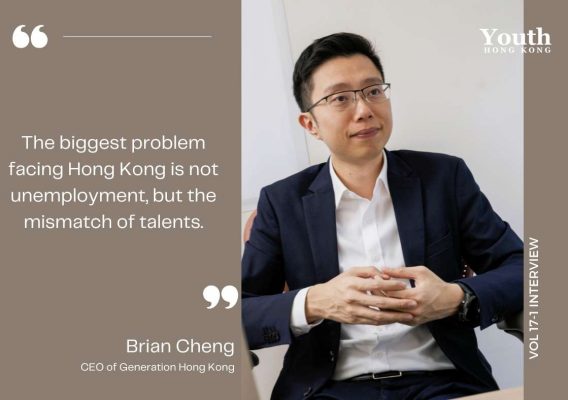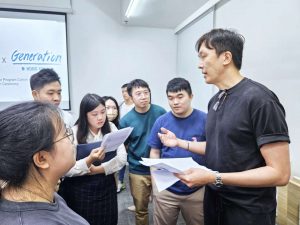In a world where technology evolves at lightning speed, lifelong learning is no longer optional—it’s essential. How can we adapt, nurture talent and thrive in this era of constant change?
Brian Cheng, CEO of Generation Hong Kong, leads his team focused on solving a global challenge: the gap between education and employment. In an interview with Youth Hong Kong, Brian shares how Generation works to empower individuals through career opportunities and the importance of upskilling in a fast-changing job market.
Generation was founded in 2014, following a McKinsey report titled Education to Employment: Getting Europe’s Youth into Work that was published a year before. The study revealed a major challenge in the job market: the skills young people learned in school often didn’t match what employers needed. This mismatch left many graduates unprepared for work, worsening youth unemployment and labour market imbalances.
To address this, McKinsey launched Generation as a global independent nonprofit that supports people to achieve mobility and a better life. In 2018, the organisation expanded to Hong Kong to support underprivileged groups and tackle local labour market issues.
In the interview, Brian explained how Generation Hong Kong adapts to technological changes and shifting job demands, highlighting the need for continuous learning and skill development. His insights give a closer look at how the organisation is nurturing talent and preparing them for an ever-changing job market.
Where are the Talents?
While Hong Kong maintains a comparatively low unemployment rate, averaging 3.30% between 1981 and 2024, with a slightly elevated rate among its youth, the city isn’t immune to the global education-employment gap. “The biggest problem facing Hong Kong is not unemployment, but the mismatch of talents,” says Brian.
The education-employment gap stems from a combination of factors: entrenched social norms that prioritise academic achievements, training programmes and academic curricula that haven’t kept pace with market demands and rapid technological advancements, and insufficient collaboration between industry needs and education.
Brian notes that in Hong Kong, doing a university degree doesn’t always mean acquiring the necessary skills for a satisfying career, but those without degrees have even less chance. As Brian says, “Our cultural norms mean that academic success is valued, but people who are ill-suited to an exam-based educational system are being left behind.”
Furthermore, even degree-level education may not help. As Brian explains, “Rapid advances, particularly in AI, may widen the gap between education and employment. Developing a university curriculum can take years and by the time students graduate, the real world may have changed.”
Do and Learn
Generation Hong Kong is tackling the talent mismatch with the seven-step methodology deployed by the whole Generation network, says Brian. It starts with employers』 requirement for not only the technical skills, but also the behavioural skills and an appropriate mindset, which supports learners to meet market demands.
Targeted individuals from less privileged academic backgrounds attend intensive 8-12-week boot camps. The Generation Hong Kong programme has also expanded to include youth with special educational needs (SEN), first-time job seekers, and mid-career professionals. “In collaboration with other organisations, we find suitably motivated and committed learners,” Brian explains.
The training programs encompass fields such as digital marketing, data engineering, web development, quality assurance, robot support, and elderly care. These are designed with a blend of technical instruction and hands-on projects.
The ultimate goal of Generation Hong Kong is to help job seekers find meaningful careers that bring a sense of satisfaction while aligning with their passions and interests. For example, Brian recounts the story of a young man who felt lost for years. He was one of the “hidden youth” with a passion for computing that he struggled to translate into a career. With Generation’s support, he secured a position as a data engineer in a retail company and found joy and fulfilment in his work.
The younger generation are generally ready to access information, says Brian, but courses that last many weeks may not prepare them for the challenges ahead. Instead, they can serve as “keys” to suitable careers. “What one learns on vocational courses or in university degrees only gives one an ‘admission ticket.’ Ultimately, when young people join a company, what they are willing to do and learn is more important than anything else. They need to learn from work experience, not only from what happens at our boot camps.”
Co-define Talent
Given recent rapid technological developments like the growth of AI, Brian points out how impossible it is to predict the future. However, some insight might be gained from examining trends over the past decade. For example, the growth of ESG (Environmental, Social, and Governance) initiatives, shifts in the geopolitical landscape and new forms of employment are giving us an idea of how fast the landscape changes.
“No matter how technology changes in future, no matter what the next revolution might be, we will always need people who can adapt quickly, and that means those who never stop learning, who stay flexible and open-minded,” comments Brian.
One example is graphic design. Mastering the complexities of Photoshop used to be essential, but now there are user-friendly online tools that offer similar potential. Despite evolving skill sets, however, he says the need for aesthetic sense and judgment remains fundamental if new tools are to be used effectively.
Believing that everyone is born with talent and a purpose, Brian hopes to expand his efforts within the education system and co-define “talent” by connecting individuals with employers and coordinating the efforts of the education sector, social workers, and commercial companies.
Brian concludes by saying that all sectors, including academic institutions, funders, the government and even job seekers themselves, need to collaborate to foster lifelong learning. In the next five to ten years, each will have a role to play in developing Hong Kong’s future talent pool. ■



